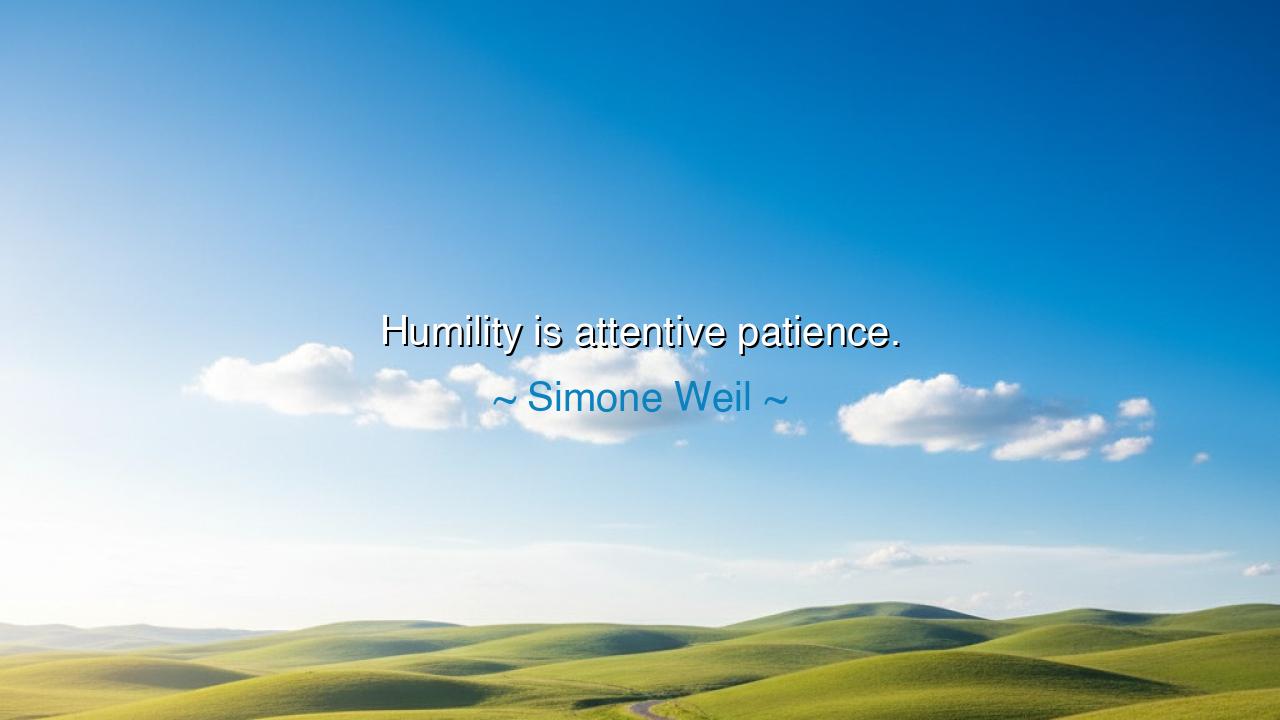
Humility is attentive patience.






The French philosopher and mystic Simone Weil, whose words burn with the fire of both intellect and spirit, once wrote: “Humility is attentive patience.” In this brief saying, she unites two virtues that are often seen apart — humility and patience — and teaches us that true humility is not passive weakness, but a vigilant, watchful waiting. To be humble is not simply to bow the head, but to listen, to endure, to wait with the heart open and the mind attuned.
Humility in this sense is an active force. It does not rush forward to impose its own will, nor does it demand immediate recognition. Instead, it holds back, attentive to the needs of others, patient with the pace of life, watchful for truth to reveal itself in its own time. This patience is not born of laziness, but of reverence — reverence for reality as it unfolds, for the mystery that cannot be forced, and for the dignity of other souls who must move at their own rhythm.
History offers us profound examples of this union of attentive patience and humility. Consider the life of Mother Teresa, who served the poorest of the poor in the streets of Calcutta. She did not rush to grandiose solutions, nor claim to change the world with sweeping proclamations. Instead, with attentive patience, she gave herself to one person at a time — feeding, cleaning, listening. Her humility was not self-deprecation, but the patient attention to the infinite worth of each life before her. And in this quiet patience, she transformed the conscience of the world.
We see the same truth in the life of Abraham Lincoln. As a leader, he was often attacked, mocked, and pressured into hasty decisions. Yet he carried himself with humility — listening to rivals, tolerating insults, waiting for the right moment to act. His patient humility allowed him to guide a fractured nation through its bloodiest war. He did not force his will through arrogance, but let time, wisdom, and compassion guide his hand. Thus, his humility was not weakness, but strength tempered by patience.
Weil’s words also contain a warning for us: humility without patience becomes mere self-abasement, and patience without attentiveness becomes empty waiting. True humility requires us to hold back our pride, to silence our restlessness, and to give time its due. It asks us to listen not only to others but to life itself, to the whispers of conscience, to the quiet guidance of the divine. This is not a passive state — it is a discipline, a heroic act of the soul.
The lesson for us, then, is to cultivate attentive patience in the way we live and act. When speaking, we should listen more than we speak, so that our words may carry wisdom rather than haste. When striving, we should wait for the right moment, knowing that time refines all efforts. When dealing with others, we should exercise patience, seeing beyond their faults to the hidden dignity within them. This is the practice of humility — to wait attentively, without pride, without rushing, trusting the unfolding of truth.
Therefore, O seekers of wisdom, inscribe Simone Weil’s teaching upon your hearts: “Humility is attentive patience.” Do not think humility means to belittle yourself, nor that patience means to do nothing. Rather, see them as the twin guardians of the soul, guiding you to act with reverence, endurance, and wisdom. Be humble enough to listen, patient enough to endure, and attentive enough to perceive what others overlook. In this way, your humility will shine not as weakness, but as the quiet strength that holds the world together.






AAdministratorAdministrator
Welcome, honored guests. Please leave a comment, we will respond soon